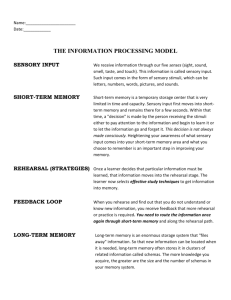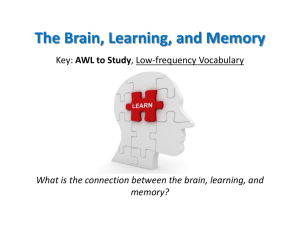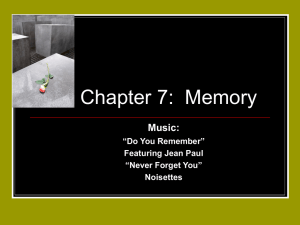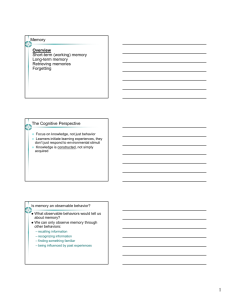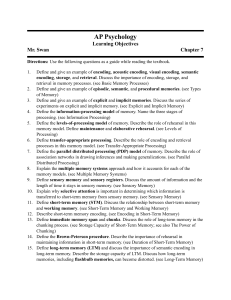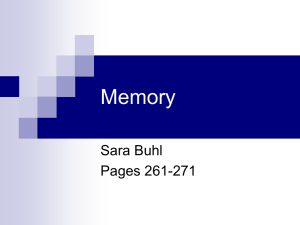Chapter 6 Memory - TigerAPpsych
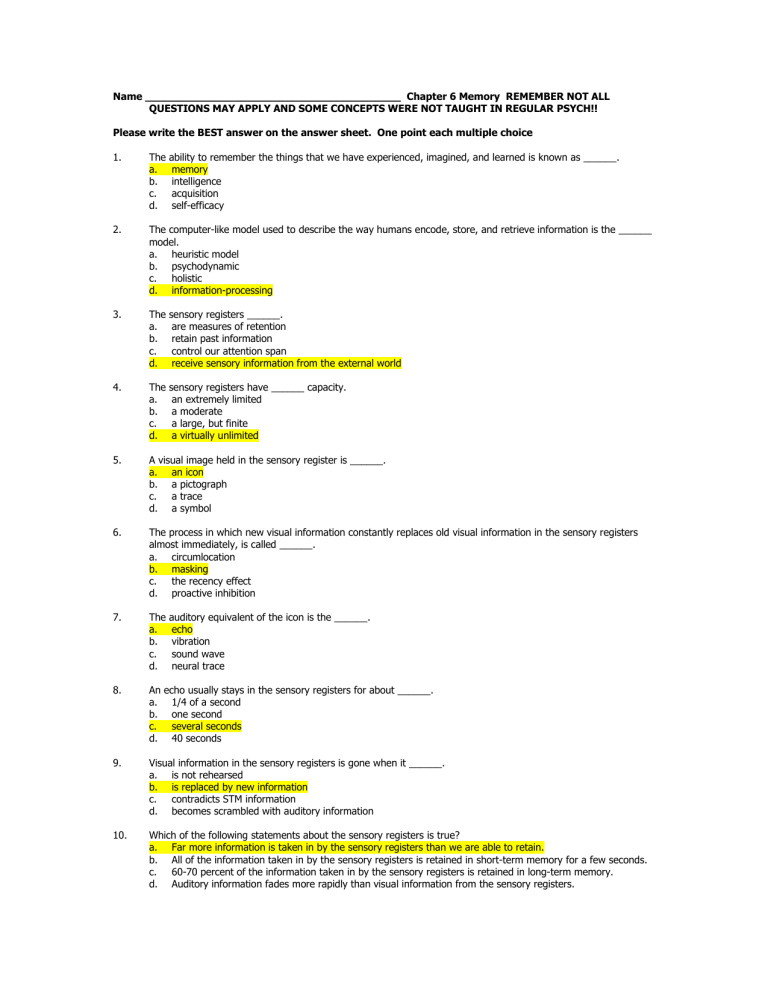
4.
3.
6.
5.
2.
1.
Name ________________________________________ Chapter 6 Memory REMEMBER NOT ALL
QUESTIONS MAY APPLY AND SOME CONCEPTS WERE NOT TAUGHT IN REGULAR PSYCH!!
Please write the BEST answer on the answer sheet. One point each multiple choice
The ability to remember the things that we have experienced, imagined, and learned is known as ______. a. memory b. intelligence c. acquisition d. self-efficacy
The computer-like model used to describe the way humans encode, store, and retrieve information is the ______ model. a. heuristic model b. psychodynamic c. holistic d. information-processing
The sensory registers ______. a. are measures of retention b. retain past information c. control our attention span d. receive sensory information from the external world
The sensory registers have ______ capacity. a. an extremely limited b. a moderate c. a large, but finite d. a virtually unlimited
A visual image held in the sensory register is ______. a. an icon b. a pictograph c. a trace d. a symbol
8.
7.
The process in which new visual information constantly replaces old visual information in the sensory registers almost immediately, is called ______. a. circumlocation b. masking c. the recency effect d. proactive inhibition
The auditory equivalent of the icon is the ______. a. echo b. vibration c. sound wave d. neural trace
An echo usually stays in the sensory registers for about ______. a. 1/4 of a second b. one second c. several seconds d. 40 seconds
9. Visual information in the sensory registers is gone when it ______. a. is not rehearsed b. is replaced by new information c. contradicts STM information d. becomes scrambled with auditory information
10. Which of the following statements about the sensory registers is true? a. Far more information is taken in by the sensory registers than we are able to retain. b. All of the information taken in by the sensory registers is retained in short-term memory for a few seconds. c. 60-70 percent of the information taken in by the sensory registers is retained in long-term memory. d. Auditory information fades more rapidly than visual information from the sensory registers.
11. Students in a psychology experiment were exposed to three notes of music for a very short period of time and then asked to recall them. If the instructions to recall the notes came immediately, the students usually succeeded. If the instructions came more than three seconds after the notes were played, the students were much less successful. The MOST plausible explanation for this phenomenon is that in the latter case ______. a. the echo never made it to the sensory registers b. the echo faded after being stored in short-term memory c. the echo was already stored in long-term memory d. the echo faded before being stored in short-term memory
12. The process of selective looking, listening, smelling, and feeling is called ______. a. retention b. cognition c. recognition d. attention
13. ______ is/are synonymous with short-term memory. a. Shadow memory b. Working memory c. Secondary memory d. Sensory registers
14. Which statement is true of short-term memory? a. It is the virtually the same thing as consciousness. b. It is permanent. c. It has a very large capacity. d. It registers information missed by the sensory registers.
15. It is now believed that short-term memory can hold as much information as can be repeated or rehearsed in
______ seconds. a. 0.5 - 1.5 b. 1.5 - 2.0 c. 2.0 - 3.5 d. 3.5 - 5.0
16. Information is grouped for storage in short-term memory through the process of ______. a. chunking b. categorizing c. rote rehearsal d. cueing
17. It is easier to remember the names of seven people you just met at a party than it is to remember their addresses (even if both pieces of information were given to you at the same time), because ______. a. there is a direct relationship between the size of the chunks in short-term memory and their retention b. there is an inverse relationship between the number of items in the sensory registers and their retention c. there is a direct relationship between the size of the chunks in the sensory registers and their retention d. there is an inverse relationship between the size of the chunks in short-term memory and their retention
18. Retaining information in short-term memory simply by repeating it over and over again is called ______. a. rote rehearsal b. overlearning c. deep processing d. elaborative rehearsal
19. The portion of memory that is more or less permanent and that corresponds with everything we "know" is called
______. a. primary memory b. eidetic memory c. working memory d. long-term memory
20. Long-term memory can store ______ amounts of information for ______ years. a. small; a few b. small; many c. vast; a few d. vast; many
21. In one study, adults who had graduated from high school more than 40 years earlier were still able to recognize the names of ______ percent of their classmates. a. 25 b. 50 c. 75 d. 100
22. Which of the following statements is true? a. Material stored by meaning can usually be retrieved word-for-word. b. Material is usually stored in long-term memory according to meaning. c. Sentences are stored verbatim in long-term memory. d. Both deep and surface structure are aspects of rote rehearsal.
23. When given a list of items to remember, the tendency of people to remember the last items in the list is called the ______. a. primacy effect b. mnemonic effect c. recency effect d. decay effect
24. When given a list of items to remember, the tendency of people to remember the first items in the list is called the ______. a. primacy effect b. mnemonic effect c. recency effect d. decay effect
25. Information in short-term memory gets transferred to long-term memory if ______. a. it is verbal b. it is nonverbal c. it gets rehearsed d. there are no distractions
26. Mastering a skill to the point that you achieve fluid, immediate performance in it, such as expert typing, is called
______. a. reflexive learning b. priming c. elaborative learning d. automaticity
27. Which of the following statements is true? a. The more an item is repeated, the more improvement will be shown in later recall. b. Extensive rote rehearsal is as efficient as elaborative rehearsal for permanent memory. c. Repetition without any intent to learn does not enhance long-term memory. d. Rote rehearsal is not effective in learning items such as ABC's.
28. The linking of new information in short-term memory to familiar material stored in long-term memory is called
______. a. rote rehearsal b. elaborative learning c. chunking d. overlearning
29. An item is easier to remember ______. a. the more indexes or associations it has in long-term memory b. the fewer indexes or associations it has in long-term memory c. if it is stored in short-term memory d. if it is part of our episodic memory
30. The type of memory that is most like an encyclopedia or a dictionary is ______. a. procedural memory b. semantic memory c. episodic memory d. emotional memory
31. The portion of long-term memory that stores information relating to skills, habits, and other perceptual-motor tasks is ______ memory. a. semantic b. emotional c. episodic d. procedural
32. The portion of long-term memory that stores specific information that has personal meaning is called ______ memory. a. semantic b. emotional c. episodic d. procedural
33. The portion of long-term memory that stores general facts and information is called ______ memory. a. semantic b. emotional c. episodic d. procedural
34. Learned emotional responses to various stimuli are known as ______ memory. a. semantic b. emotional c. episodic d. procedural
35. Memory for information that was intentionally committed to memory or intentionally retrieved from memory is called ______. a. implicit memory b. eidetic memory c. procedural memory d. explicit memory
36. Memory for information that either was unintentionally committed to memory or was unintentionally retrieved from memory is called ______. a. implicit memory b. eidetic memory c. procedural memory d. explicit memory
37. Implicit memory includes ______ memories. a. episodic and procedural b. procedural and emotional c. emotional and semantic d. semantic and episodic
38. Explicit memory includes ______ memories. a. episodic and procedural b. procedural and emotional c. emotional and semantic d. semantic and episodic
39. Suddenly thinking of a friend's name without knowing why is an example of ______ memory. a. implicit b. eidetic c. procedural d. explicit
40. Chunking is a means of ______. a. immediately forgetting irrelevant details b. organizing information into meaningful units c. arranging details into a hierarchy from most to least important d. storing long-term memories
41. If you want to remember something for a couple of minutes, the MOST effective device is ______. a. visual imagery b. tactile imagery c. rote rehearsal d. elaborative rehearsal
42. Our visual sensation of a passing automobile would be initially stored in ______. a. the sensory registers b. short-term memory c. long-term memory d. the hippocampus
43. An old joke tells of an elephant who walks into a bar and tells the bartender, "Boy, have I got a problem.
Elephants are supposed to have good memories and I can't remember a thing." "That's too bad," says the bartender, "Maybe I can help you with your problem." "What problem?" asks the elephant. The elephant in the story is demonstrating a deficiency in ______. a. sensory processing b. short-term memory c. long-term memory d. eidetic memory
44. Remembering that the French word "maison" means house by connecting maison with the English word
"masonry" illustrates the use of ______. a. elaborative rehearsal b. rote rehearsal c. semantic rehearsal d. chunking
45. Arnie finally got the telephone number of a girl he's been wanting to ask out for a date. Unfortunately, he had nothing to write the number on when it was told to him. To keep from forgetting the number, he simply repeats it aloud until he can find a pen and some paper. His memory tactic is called ______. a. deep processing b. distractor inhibition c. rote rehearsal d. elaborative rehearsal
46. The meaning of the word "civilization" would be stored in ______. a. the sensory registers b. short-term memory c. eidetic memory d. long-term memory
47. What we are thinking of at any given moment, or what we commonly know as "consciousness," is ______. a. long-term memory b. short-term memory c. secondary memory d. cognitive dissonance
48. Remembering a friend's description of a recent cross-country skiing trip by associating the things she describes with a film you have seen on the subject is ______. a. rote rehearsal b. narrative rehearsal c. retrograde rehearsal d. elaborative rehearsal
49. Loni is asked to memorize the letters I K T E A L N. She memorizes them by reorganizing them into the words
"INK" and "LATE." This tactic is called ______. a. cueing b. rote rehearsal c. shadowing d. chunking
50. When we are pricing items in a grocery store, and we attempt to remember the prices of three different brands of 7-ounce cans of tuna fish by repeating them again and again, the information is being held in ______. a. short-term memory b. secondary memory c. the sensory registers d. long-term memory
51. While memorizing a list of words, students are exposed to the smell of chocolate. The next day, the same students are tested on their recall of the word list and it is found that they are more likely to recall words if they are again exposed to the smell of chocolate. The effect of the chocolate is MOST likely due to ______. a. procedural memory b. eidetic memory c. implicit memory d. explicit memory
52. Remembering how to ride a bicycle, swim, or write your name are examples of ______ memory. a. semantic b. emotional c. episodic d. procedural
53. Your memories of personal information such as what you wore to work yesterday or what you ate for breakfast this morning are stored in ______. a. procedural memory b. semantic memory c. episodic memory d. emotional memory
54. On a TV game show, Jeanette is asked to name the state capital of Vermont. This information is MOST likely stored in ______. a. procedural memory b. semantic memory c. episodic memory d. emotional memory
55. Feeling enraged at the sight of a burning cross in someone's yard is an example of ______ memory. a. semantic b. emotional c. episodic d. procedural
56. When Rip Van Winkle returns to his native village, after 20 years of sleeping in the mountains, he goes immediately to the location of his former house and asks for his wife and children by name. The kind of memory he is exhibiting by remembering his home's location and the names of his wife and children is ______. a. procedural memory b. semantic memory c. episodic memory d. emotional memory
57. Memories consist of ______. a. changes in synaptic connections among neural cells b. production of new specialized neurons that are designed to store memories c. production of new specialized glial cells that are designed to store memories d. structural changes in the endocrine system
58. Learning tends to occur ______; consolidation of memories occurs ______. a. slowly; slowly b. slowly; quickly c. quickly; slowly d. quickly; quickly
59. The changes in neurons that occur when learning takes place are called ______. a. chunking b. consolidation c. schemata d. priming
60. It can take ______ for long-term memories to become fully stable. a. days b. weeks c. months d. years
61. Two hormones that are crucial to learning are ______. a. epinephrine and cortisol b. vasopressin and thyroxin c. thyroxin and norepinephrine d. norepinephrine and vasopressin
62. When studying for an exam, your performance will probably be best if you study with ______. a. no anxiety at all b. a little anxiety c. high levels of anxiety d. a state of panic
63. Lashley's experiments with rats indicated that the degree or amount of recall that remained after the removal of brain tissue depended on ______. a. which specific part of the brain was removed b. whether or not the hippocampus was removed c. how much brain mass was removed d. whether or not the limbic system was removed
64. The ______ are crucial in the formation of long-term memories. a. cerebellum and thalamus b. amygdala and prefrontal cortex c. basal ganglia and occipital cortex d. hippocampus and temporal cortex
65. The hippocampus is instrumental in ______. a. the formation of short-term memory b. the retrieval of memories from long-term memory c. maintaining a constant level of information filtration by the sensory registers d. transferring information from short-term to long-term memory
66. Episodic memories seem to be located primarily in the ______ lobes of the cortex. a. frontal and occipital b. frontal and temporal c. temporal and parietal d. parietal and occipital
67. Procedural memories appear to be stored primarily in the ______. a. cerebellum b. frontal lobes c. amygdala d. temporal lobes
68. Emotional memories are primarily dependent on the ______. a. cerebellum b. hippocampus c. amygdala d. frontal lobes
69. The passing of time causes forgetting according to ______. a. interference theory b. optimization theory c. reduction theory d. decay theory
70. In an experiment, subjects are asked to learn the letters P, S, and Q. Then they are asked to count backward by threes from the number 167. They are then asked to recall the three letters (PSQ) they had earlier memorized.
Most people cannot remember the letters. This type of study is a ______. a. distractor study b. interference study c. reduction study d. rote rehearsal study
71. Bobby is unable to transfer new material from short-term memory to long-term memory, even though his longterm memory still works well enough to retrieve old memories from his distant past. He is MOST likely suffering from ______. a. Milner's syndrome b. retrograde amnesia c. Alzheimer's disease d. Korsakoff's psychosis
72. The patient known as "HM" had his hippocampus removed to relieve him of epileptic seizures. Subsequently, he lost which of the following abilities? a. procedural memory b. the capacity to process short-term memories into long-term storage c. basic reasoning abilities d. the ability to retrieve memories already stored in long-term memory
73. A degenerative disease which is an untreatable neurological disorder involving severe, progressive memory loss is called ______. a. Milner's syndrome b. retrograde amnesia c. Alzheimer's disease d. Korsakoff's syndrome
74. A form of amnesia related to chronic alcoholism is ______. a. Wernicke's syndrome b. Korsakoff's syndrome c. Milner's syndrome d. Alzheimer's disease
75. Head injuries, such as concussions, are a common cause of ______. a. Milner's syndrome b. retrograde amnesia c. psychogenic amnesia d. Korsakoff's syndrome
76. Retrograde amnesia is characterized by forgetting ______. a. events that were in short-term memory at the time of an accident b. events that were in the sensory register at the time of an accident c. events that occurred in the distant past d. all memories related to a person's identity
77. The neurotransmitter that appears to be instrumental in the memory process is ______. a. serotonin b. dopamine c. norepinephrine d. acetylcholine
78. According to ______ theory, information gets mixed up with or pushed aside by other information in short-term memory, making it harder to remember. a. interference b. distractor c. stimulus-response d. decay
79. Retroactive interference of long-term memory means ______. a. new material interferes with remembering old material b. new material represses short-term memories c. old material interferes with remembering new material d. old material has eliminated memories of new material
80. Proactive interference of long-term memory means ______. a. new material interferes with remembering old material b. new material represses short-term memories c. old material interferes with remembering new material d. old material has eliminated memories of new material
81. The most important determinant of interference is ______. a. complexity b. decay c. similarity d. rehearsal time
82. Tammy is talking to her grandfather. She loves to listen to him tell stories about when he was a child. He has vivid recollections of his youth and enjoys telling people about his fond memories. Unfortunately, grandpa has difficulty remembering what happened within the last few days or weeks. If there are no physiological problems, grandpa's memory problems are BEST explained by ______. a. proactive interference b. memory diffusion c. retroactive interference d. retrograde amnesia
83. Tim is studying for a test. After seven consecutive hours of studying, he finds he can remember what he just finished studying, but he can no longer remember what he studied five or six hours ago. Tim's memory problems are BEST explained by ______. a. proactive interference b. memory diffusion c. retroactive interference d. retrograde amnesia
84. When environmental factors that were present during learning are absent during recall, the effort to remember is often less successful. This is known as ______. a. retroactive interference b. cue-dependent forgetting c. proactive interference d. state-dependent forgetting
85. The phenomenon whereby people learn information while in a particular mood or mind-set tend to better recall that information when in a similar mood or mind-set is known as ______. a. the primacy effect b. cue-dependent memory c. the recency effect d. state-dependent memory
86. The phenomenon in which memories are not lost, but are transformed into something at least partly different from what they were originally is ______. a. eidetic memory b. proactive interference c. retroactive interference d. reconstructive memory
87. In interviewing witnesses to a bank robbery, detective Watson hears a slightly different story from each witness.
Some witnesses say the robber was tall, while others maintain he was short. Some say he was wearing a black jacket, while others say it was blue. One person even said there were two robbers. The MOST likely explanation for these differences in the witnesses recall is ______. a. eidetic imagery b. proactive interference c. retroactive interference d. reconstructive memory
88. A student who studies in her kitchen at home has more difficulty remembering the material in the exam room than she did in her kitchen. This is most likely due to ______. a. retroactive interference b. cue-dependent forgetting c. proactive interference d. state-dependent forgetting
89. A student who studies for an exam while mildly anxious is most likely to remember the material in the exam room if she is also mildly anxious. This is most likely due to ______. a. the primacy effect b. cue-dependent memory c. the recency effect d. state-dependent memory
90. Our recollection of the events that have occurred in our life and when those events took place is called ______ memory. a. autobiographical b. procedural c. reconstructive d. semantic
91. A study of the autobiographies of 49 well-known psychologists found that 80 percent of their autobiographically consequential experiencesÄÄformative decisionsÄÄoccurred between the ages of ______. a. birth to 18 b. 18 to 35 c. 35 to 50 d. 50 to 65
92. It is extremely rare for people to recall events that occurred before the age of ______. a. 2 b. 3 c. 4 d. 5
93. The phenomenon whereby most people cannot recall events that occurred in their life before the age of 2, is called ______. a. infantile autism b. psychogenic amnesia c. pretensile amnesia d. infantile amnesia
94. Each of the following is a current explanation for infantile amnesia EXCEPT ______. a. it results from repression of threatening memories, thoughts, and feelings that were too emotionally charged for the infant to cope with at the time b. the child's brain is not fully developed enough to efficiently process and store information in memory c. infants may lack well-developed schemas for organizing and interpreting new information in memory d. infants lack the appropriate cues and repetition necessary to efficiently recall new information at a later date
95. Many middle-aged adults can vividly recall where they were and what they were doing the day that John F.
Kennedy was assassinated, although they cannot remember what they were doing the day before he was assassinated. This is an example of ______. a. an eidetic image b. a flashbulb memory c. a semantic memory d. a procedural memory
96. Flashbulb memories ______. a. are not subject to periodic revision b. usually concern events that are emotionally charged c. are almost always highly accurate d. usually concern events from early childhood
Short Essay: please explain the how both Leonard and Clive represent issues from this chapter (and Ch 2 and 12 as well). Identify the specific disorder for each, and how each man is inflected w/this
“condition”. Please identify four facts from the board yesterday & how they apply to Clive AND
Leonard. 14 poi


